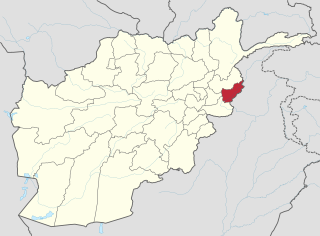
Jaish-e-Mohammed is a Pakistan-based Deobandi Jihadist militant group active in Kashmir which is widely considered as a islamic terrorist group. The group's primary motive is to separate Kashmir from India and merge it into Pakistan.

The 1996–2001 Afghan Civil War took place between the Taliban's conquest of Kabul and their establishing of the Islamic Emirate of Afghanistan on 27 September 1996, and the US and UK invasion of Afghanistan on 7 October 2001: a period that was part of the Afghan Civil War that had started in 1989, and also part of the war in Afghanistan that had started in 1978.

The insurgency in Khyber Pakhtunkhwa, also known as the War in North-West Pakistan or Pakistan's war on terror, is an ongoing armed conflict involving Pakistan and Islamist militant groups such as the Tehrik-i-Taliban Pakistan (TTP), Jundallah, Lashkar-e-Islam (LeI), TNSM, al-Qaeda, and their Central Asian allies such as the ISIL–Khorasan (ISIL), Islamic Movement of Uzbekistan, East Turkistan Movement, Emirate of Caucasus, and elements of organized crime. Formerly a war, it is now a low-level insurgency as of 2017.

The Pakistani Taliban, formally called the Tehreek-e-Taliban-e-Pakistan, is an umbrella organization of various Islamist armed militant groups operating along the Afghan–Pakistani border. Formed in 2007 by Baitullah Mehsud, its current leader is Noor Wali Mehsud, who has publicly pledged allegiance to the Afghan Taliban. The Pakistani Taliban share a common ideology with the Afghan Taliban and have assisted them in the 2001–2021 war, but the two groups have separate operation and command structures.
In 2009, Pakistan suffered 50 terrorist, insurgent and sectarian-related incidents that killed 180 people and injured 300.
Events in the year 2014 in Pakistan.
The following lists events that happened during 2015 in Pakistan.
This is a list of terrorist incidents in Pakistan in 2014.
Adnan Rashid is a Pakistani cricket umpire and militant commander of Tehreek-i-Taliban Pakistan and former junior technician of the Pakistan Air Force. He is the chief of Ansar Al-Aseer, the TTP's unit tasked to free militant prisoners.

On 16 December 2014, six gunmen affiliated with the Tehrik-i-Taliban Pakistan (TTP) conducted a terrorist attack on the Army Public School in the northwestern Pakistani city of Peshawar. The terrorists, all of whom were foreign nationals, comprising one Chechen, three Arabs and two Afghans, entered the school and opened fire on school staff and children, killing 149 people including 132 schoolchildren ranging between eight and eighteen years of age, making it the world's fifth deadliest school massacre. In retaliation, Pakistan launched a rescue operation undertaken by the Pakistan Army's Special Services Group (SSG) special forces, who killed all six terrorists and rescued 960 people. In the long term, Pakistan established the National Action Plan to crack down on terrorism.

2014 Kunar Offensive refers to a 2014 armed conflict of the War in Afghanistan, between the Afghan Army and a terrorist group, Tehrik-i-Taliban Pakistan (TTP). It occurred in the Dangam district of eastern Kunar province, in Afghanistan bordering on Pakistan.

The Counter Terrorism Department (Urdu: سررشتہِ تحقیقاتِ جرائم ، پاکستان; CTD) formerly known as the Crime Investigation Department (CID), are crime scene investigation, interrogation, anti-terrorism, and intelligence bureaus of the provincial police services of Pakistan.
The National Action Plan is an action plan that was established by the Government of Pakistan in December 2014 to crack down on terrorism and to supplement the ongoing anti-terrorist offensive in Federally Administered Tribal Areas. It is considered as a major coordinated state retaliation following the deadly 2014 Peshawar school attack. The plan received unprecedented levels of support and co-operation across the country's political spectrum, inclusive of the federal and provincial governments.

On 13 May 2015, eight gunmen attacked a bus travelling in Safoora Goth, Karachi, Sindh in Pakistan. The shooting left at least 46 people dead. All of the victims were of the Ismaili Shia Muslim minority, suggesting the attack was a targeted killing of sectarian nature.
On 20 January 2016, four terrorists opened fire at Bacha Khan University near Charsadda, Pakistan. It is located in the Charsadda District of Khyber Pakhtunkhwa. At least 22 people were killed and over 20 others were wounded. Over 200 students were rescued from the premises, while the terrorists were killed by security forces. The Tariq Geedar Afridi faction of the Tehrik-i-Taliban claimed responsibility for the attack.
Operation Radd-ul-Fasaad is a codename of a combined military operation by the Pakistani military in support of local law enforcement agencies to disarm and eliminate the terrorist sleeper cells across all states of Pakistan, started on 22 February 2017. The operation is aimed to eliminate the threat of terrorism, and consolidating the gains of Operation Zarb-e-Azb which was launched in 2014 as a joint military offensive. It is further aimed at ensuring the security of Pakistan's borders. The operation is ongoing active participation from Pakistan Army, Pakistan Air Force, Pakistan Navy, Pakistan Police and other Warfare and Civil Armed Forces managed under the Government of Pakistan. More than 375,000 operations have been carried out against terrorists so far. This Operation has been mostly acknowledged after Operation Zarb e Azb.
On 1 December 2017, 3–4 gunmen arrived at the hostel of Agricultural Training Institute at Agricultural University Peshawar and started firing as a result of which at least 13 people were killed and 35+ were injured. Tehreek-e-Taliban claimed responsibility for the attack.

Muhammad Ali Wazir is a Pakistani politician who is the co-founder of a human rights movement, Pashtun Tahafuz Movement (PTM). He had been a member of the National Assembly of Pakistan from August 2018 till August 2023. During his student life, he was active in the Pashtun Students Federation (PSF), an allied wing of the Awami National Party (ANP).
On 18 December 2022, the Pakistani Taliban carried out an attack on a counterterrorism centre in the Bannu District, Khyber Pakhtunkhwa. They took the officers hostage until 20 December, when Pakistan's security forces lay siege to the centre, releasing all the hostages and killing 25 militants inside. Two officers were killed during the siege.









